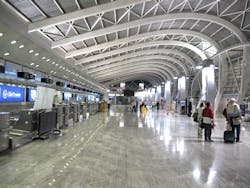Coronavirus impacts aerospace industry - Airbus pauses production in France and Spain; Boeing asks for financial assistance for American manufacturers and suppliers
NASHUA, N.H. - The novel coronavirus (COVID-19) has wreaked havoc on people and markets around the world. On the financial side of the equation, the aerospace and air travel industries are among the most impacted.
In the United States, Boeing says more than 2.5 million Americans work in the aerospace industry at more than 17,000 suppliers. According to the Air Transport Action Group (ATAC), some 10.2 million people make a living in the aviation industry worldwide. Expanded to tourism and jobs supported by aviation, ATAC says that figure tops 65 million. In the current environment of "social isolation," medical professionals urge people to stay home, and super jumbo jets like the Airbus A380, which can can seat more than 500 passengers, are being mothballed. Earlier this month, Lufthansa parked its fleet of 14 A380s after the company was only able to fill the massive commercial jet to 35% capacity.
Airbus recently disclosed that an employee at its Madrid facility has tested positive for COVID-19 and is seeking medical attention.
"As a precautionary measure, all co-workers who have been in direct contact with this employee have been asked to self-quarantine by staying at home for the next 14 days," Airbus said in a statement last week. "Health and safety is our number one priority. Airbus is following medical protocols from global and national health authorities and has implemented staff guidelines in relation to social interactions, hygiene, travel and visits to Airbus."
On March 17, Airbus announced that because of the coronavirus it would be closing production and assembly plants in France and Spain for four days.
"This will allow sufficient time to implement stringent health and safety conditions in terms of hygiene, cleaning and self-distancing, while improving the efficiency of operations under the new working conditions. In those countries, the company will also continue to maximize homeworking wherever possible," said Airbus. "These measures will be implemented locally in coordination with the social partners. Airbus is also working together with its customers and suppliers to minimize the impact of this decision on their operations."
Helping hand
On March 17, Boeing announced that it was requesting a minimum of $60 billion in liquid capital be made available to the American aerospace industry to keep it afloat amidst the pandemic.
"This will be one of the most important ways for airlines, airports, suppliers and manufacturers to bridge to recovery," Boeing said in a statement. "Funds would support the health of the broader aviation industry, because much of any liquidity support to Boeing will be used for payments to suppliers to maintain the health of the supply chain. The long term outlook for the industry is still strong, but until global passenger traffic resumes to normal levels, these measures are needed to manage the pressure on the aviation sector and the economy as a whole."
The company continued, "We’re leveraging all our resources to sustain our operations and supply chain. We continue to assess additional levers as we navigate the current challenges and position the industry for the long term. As reported last week, drawing on our delayed draw loan term was a prudent step to increase our liquidity and ease some of the significant near-term pressures on our business. We filed an 8-K today to formally disclose that draw down."
President Donald Trump answered Boeing's call for aerospace sector assistance, saying "Yes, I think we have to protect Boeing. We have to absolutely help Boeing. Obviously when the airlines aren't doing well then Boeing is not going to be doing well. So we'll be helping Boeing."
However, no legislation has yet reached the Resolute Desk as of publication for financial assistance for the aerospace or other sectors.
About the Author
Jamie Whitney
Senior Editor
Jamie Whitney joined the staff of Military & Aerospace Electronics in 2018 and oversees editorial content and produces news and features for Military & Aerospace Electronics, attends industry events, produces Webcasts, and oversees print production of Military & Aerospace Electronics.
